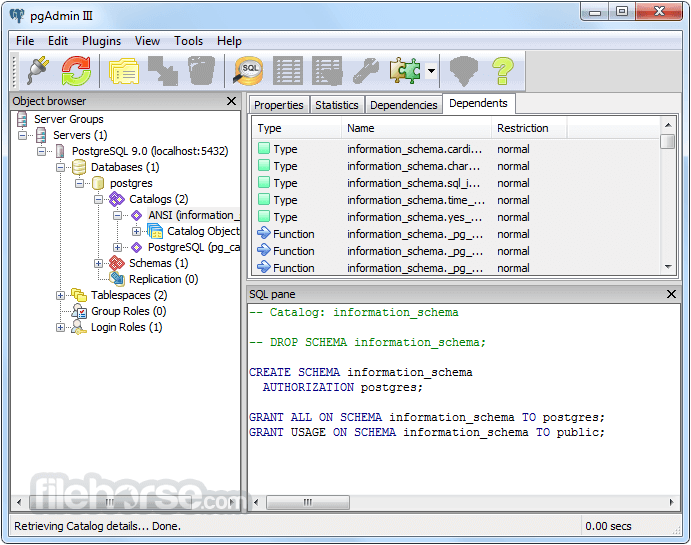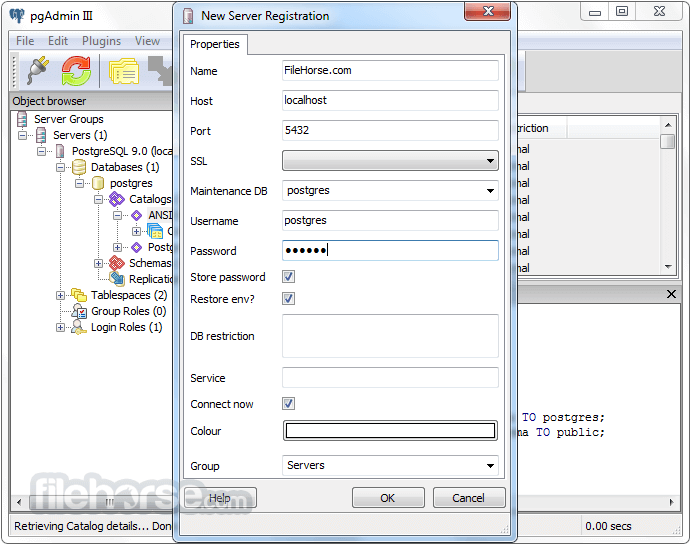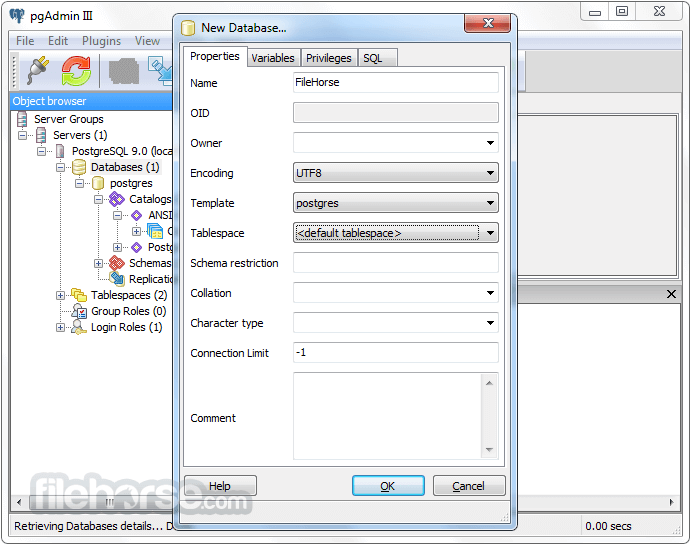-
Latest Version
-
Operating System
Windows XP64 / Vista64 / Windows 7 64 / Windows 8 64 / Windows 10 64
-
User Rating
Click to vote -
Author / Product
-
Filename
postgresql-9.5.3-1-windows-x64.exe
Sometimes latest versions of the software can cause issues when installed on older devices or devices running an older version of the operating system.
Software makers usually fix these issues but it can take them some time. What you can do in the meantime is to download and install an older version of PostgreSQL 9.5.3 (64-bit).
For those interested in downloading the most recent release of PostgreSQL or reading our review, simply click here.
All old versions distributed on our website are completely virus-free and available for download at no cost.
We would love to hear from you
If you have any questions or ideas that you want to share with us - head over to our Contact page and let us know. We value your feedback!
What's new in this version:
- Clear the OpenSSL error queue before OpenSSL calls, rather than assuming it's clear already; and make sure we leave it clear afterwards (Peter Geoghegan, Dave Vitek, Peter Eisentraut)
- This change prevents problems when there are multiple connections using OpenSSL within a single process and not all the code involved follows the same rules for when to clear the error queue. Failures have been reported specifically when a client application uses SSL connections in libpq concurrently with SSL connections using the PHP, Python, or Ruby wrappers for OpenSSL. It's possible for similar problems to arise within the server as well, if an extension module establishes an outgoing SSL connection.
- Fix "failed to build any N-way joins" planner error with a full join enclosed in the right-hand side of a left join (Tom Lane)
- Fix incorrect handling of equivalence-class tests in multilevel nestloop plans (Tom Lane)
- Given a three-or-more-way equivalence class of variables, such as X.X = Y.Y = Z.Z, it was possible for the planner to omit some of the tests needed to enforce that all the variables are actually equal, leading to join rows being output that didn't satisfy the WHERE clauses. For various reasons, erroneous plans were seldom selected in practice, so that this bug has gone undetected for a long time.
- Fix corner-case parser failures occurring when operator_precedence_warning is turned on (Tom Lane)
- An example is that SELECT (ARRAY[])::text[] gave an error, though it worked without the parentheses.
- Fix query-lifespan memory leak in GIN index scans (Julien Rouhaud)
- Fix query-lifespan memory leak and potential index corruption hazard in GIN index insertion (Tom Lane)
- The memory leak would typically not amount to much in simple queries, but it could be very substantial during a large GIN index build with high maintenance_work_mem.
- Fix possible misbehavior of TH, th, and Y,YYY format codes in to_timestamp() (Tom Lane)
- These could advance off the end of the input string, causing subsequent format codes to read garbage.
- Fix dumping of rules and views in which the array argument of a value operator ANY (array) construct is a sub-SELECT (Tom Lane)
- Disallow newlines in ALTER SYSTEM parameter values (Tom Lane)
- The configuration-file parser doesn't support embedded newlines in string literals, so we mustn't allow them in values to be inserted by ALTER SYSTEM.
- Fix ALTER TABLE ... REPLICA IDENTITY USING INDEX to work properly if an index on OID is selected (David Rowley)
- Avoid possible misbehavior after failing to remove a tablespace symlink (Tom Lane)
- Fix crash in logical decoding on alignment-picky platforms (Tom Lane, Andres Freund)
- The failure occurred only with a transaction large enough to spill to disk and a primary-key change within that transaction.
- Avoid repeated requests for feedback from receiver while shutting down walsender (Nick Cleaton)
- Make pg_regress use a startup timeout from the PGCTLTIMEOUT environment variable, if that's set (Tom Lane)
- This is for consistency with a behavior recently added to pg_ctl; it eases automated testing on slow machines.
- Fix pg_upgrade to correctly restore extension membership for operator families containing only one operator class (Tom Lane)
- In such a case, the operator family was restored into the new database, but it was no longer marked as part of the extension. This had no immediate ill effects, but would cause later pg_dump runs to emit output that would cause (harmless) errors on restore.
- Fix pg_upgrade to not fail when new-cluster TOAST rules differ from old (Tom Lane)
- pg_upgrade had special-case code to handle the situation where the new PostgreSQL version thinks that a table should have a TOAST table while the old version did not. That code was broken, so remove it, and instead do nothing in such cases; there seems no reason to believe that we can't get along fine without a TOAST table if that was okay according to the old version's rules.
- Fix atomic operations for PPC when using IBM's XLC compiler (Noah Misch)
- Reduce the number of SysV semaphores used by a build configured with --disable-spinlocks (Tom Lane)
- Rename internal function strtoi() to strtoint() to avoid conflict with a NetBSD library function (Thomas Munro)
- Fix reporting of errors from bind() and listen() system calls on Windows (Tom Lane)
- Reduce verbosity of compiler output when building with Microsoft Visual Studio (Christian Ullrich)
- Support building with Visual Studio 2015 (Michael Paquier, Petr Jelínek)
- Fix putenv() to work properly with Visual Studio 2013 (Michael Paquier)
- Avoid possibly-unsafe use of Windows' FormatMessage() function (Christian Ullrich)
- Use the FORMAT_MESSAGE_IGNORE_INSERTS flag where appropriate. No live bug is known to exist here, but it seems like a good idea to be careful.
- Update time zone data files to tzdata release 2016d for DST law changes in Russia and Venezuela. There are new zone names Europe/Kirov and Asia/Tomsk to reflect the fact that these regions now have different time zone histories from adjacent regions.
 OperaOpera 126.0 Build 5750.18 (64-bit)
OperaOpera 126.0 Build 5750.18 (64-bit) MalwarebytesMalwarebytes Premium 5.4.6
MalwarebytesMalwarebytes Premium 5.4.6 PhotoshopAdobe Photoshop CC 2026 27.2 (64-bit)
PhotoshopAdobe Photoshop CC 2026 27.2 (64-bit) BlueStacksBlueStacks 10.42.153.1003
BlueStacksBlueStacks 10.42.153.1003 OKXOKX - Buy Bitcoin or Ethereum
OKXOKX - Buy Bitcoin or Ethereum Premiere ProAdobe Premiere Pro CC 2025 25.6.3
Premiere ProAdobe Premiere Pro CC 2025 25.6.3 PC RepairPC Repair Tool 2025
PC RepairPC Repair Tool 2025 Hero WarsHero Wars - Online Action Game
Hero WarsHero Wars - Online Action Game TradingViewTradingView - Trusted by 60 Million Traders
TradingViewTradingView - Trusted by 60 Million Traders WPS OfficeWPS Office Free 12.2.0.23155
WPS OfficeWPS Office Free 12.2.0.23155










Comments and User Reviews